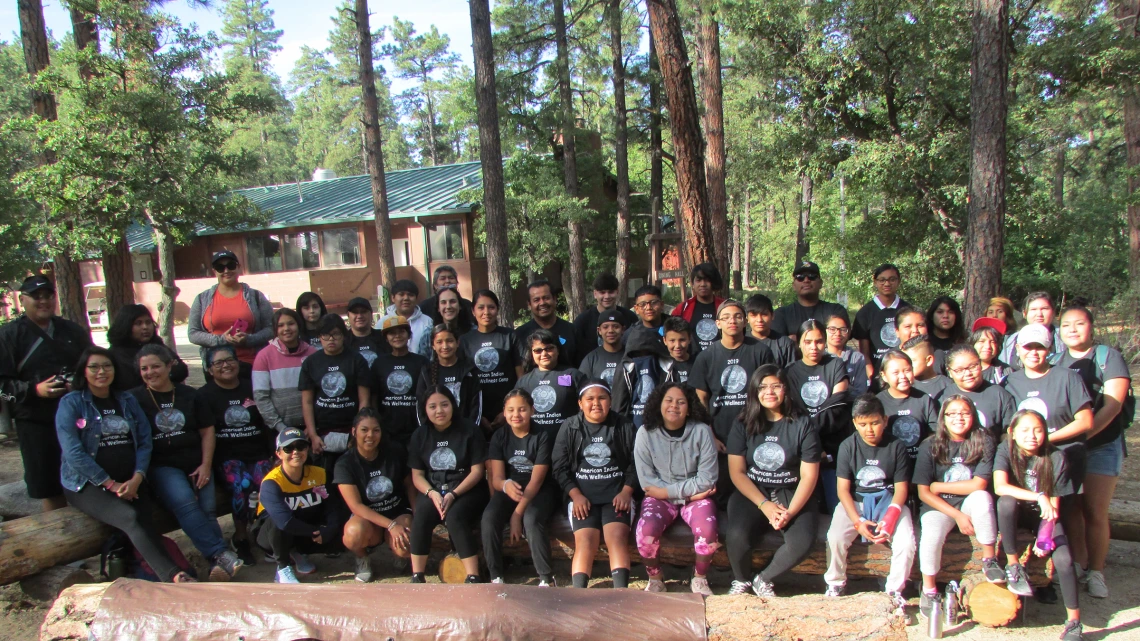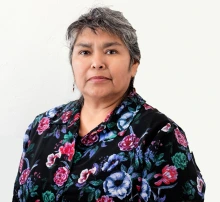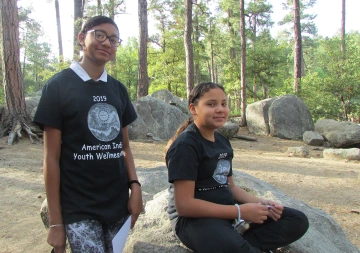Study Aims to Improve Health for American Indian Youth
NIH-funded study will work with tribal partners to develop and assess family and caregiver intervention to reduce health risks for American Indian youth.

The American Indian Youth Wellness Camp in Prescott, Ariz, teaches healthy lifestyle choices to kids at risk for or diagnosed with type 2 diabetes.
A new study led by the College of Medicine Tucson's Department of Family and Community Medicine aims to improve the health of American Indian youth by reducing their risk for obesity and related metabolic diseases through the adoption of healthier behaviors.
The project is supported by a five-year, $2.8 million grant from the National Institute on Minority Health and Health Disparities, part of the National Institutes of Health (NIH).

Francine C. Gachupin, PhD, MPH
The “Achieving American Indian Youth Energy and Mental Health Balance” grant is led by Francine C. Gachupin, PhD, MPH, associate professor and assistant director of the department’s Native American Research and Training Center, and member of the University of Arizona Cancer Center.
“We know that American Indian youth have the highest prevalence of obesity of all ethnic groups in the United States,” Dr. Gachupin said. “This puts them at a much higher risk for adult obesity and obesity-driven diseases such as diabetes, cardiovascular disease, high blood pressure, stroke and cancer.”
Dr. Gachupin and her team will work in partnership with Arizona tribal partners to develop and test a community-led intervention that aims to increase parental and caregiver engagement.
This new program expands on her American Indian Youth Wellness Camp, a weeklong intensive program that includes health screenings, nutrition education, physical activities and mind-body medicine skills training.
Historically, about 25% of camp participants meet the criteria for severe obesity. The study will extend activities after the camp by continuing contact with youth and involving parents and caregivers.
“To build on this success and to enhance the impact of our efforts, we recognize the intervention must transfer camp-acquired knowledge, skills and behaviors to the home setting,” Dr. Gachupin explained. “Parental support and attention to emotional well-being and coping skills are essential additions to the current programming to ensure changes are enacted and sustained in youth over time.”
“Physical well-being and mental well-being are critically important for all of us, but especially for young people, who are establishing habits that could stay with them for life,” said University of Arizona President Robert C. Robbins, MD.
“American Indian youth are disproportionately impacted by adverse childhood events, trauma, poverty and stress, and a responsive intervention must address individual, interpersonal, community and societal influences over the life course,” Dr. Gachupin said
Over the past six years, Dr. Gachupin and her tribal partners have organized American Indian youth summer camps to promote healthful eating and physical activity, resulting in improved cardiometabolic health.
Dr. Gachupin credits the leadership and her peers at the Department of Family and Community Medicine for lending support to the program “through helping me with fundraising, operations and logistics, hiring students, infrastructure, public relations and ensuring scientific rigor.”

UArizona researchers look to incorporate creative interventions in family-caregiver engagement approach to mind-body medicine skills that build a positive body image.
Department Chair and Cancer Center member Myra Muramoto, MD, MPH, and camp founder Jennie Joe, PhD, MPH, check in with Dr. Gachupin regularly when camp is in session, and Dr. Muramoto has personally met with the kids and tribal partners at camp.
“This NIH grant underscores the important work Dr. Gachupin is doing to create healthy lifestyles in culturally relevant ways that leverage the strengths of family and community. I am hopeful the efforts being undertaken by Dr. Gachupin, her team and the tribal partners will help have a positive impact in these young peoples’ lives,” said University of Arizona President Robert C. Robbins, MD.
UArizona researchers look to incorporate creative interventions in family-caregiver engagement approach to mind-body medicine skills that build a positive body image.
If successful, the program “will be the first family-based intervention for chronic disease prevention in American Indian adolescents,” Dr. Gachupin said.
“This grant is a testament to Dr. Gachupin’s leadership and dedication to improve the health of American Indians through culturally relevant research, conducted in true partnership with tribal communities,” said Dr. Muramoto.

